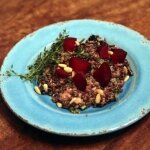
From our joints to our sinuses, inflammation affects nearly all of the body’s functions. Long-term inflammation, or chronic inflammation, can lead to increased tissue destruction, fibrosis and even depression and anxiety. Although inflammation is caused from a variety of factors including physical injury, infection or toxins, recent studies indicate stress, trauma and diet play a major role in producing cytokines that trigger inflammation in the body.
In recent years, more scientists have turned their focus toward diet and nutrition as a key factor in reducing inflammation and recovering from depression, bipolar disorder and other mood disorders. Cytokines trigger inflammation in the body, and these proteins rise considerably in depressive episodes of bipolar disorder and drop significantly during periods of lull. Studies have proven time and time again that a diet rich in trans fat and processed sugar can dramatically amplify inflammation levels. There is hope though, eating healthy and avoiding certain foods can significantly lower mental illness and improve our body, mind and emotional wellness. The website “Mind Body Green” offers a list of six inflammatory foods to avoid as part of a complete diet:
- Cow Dairy: Our body does not digest dairy easily, especially that from a cow. A good alternative would be sheep or goat dairy that contains a less inflammatory form of casein and is easier on digestion.
- Wheat Flour: Instead of wheat flour when baking opt for almond or coconut flour, which are minimally processed.
- Processed Sugar: Avoid eating processed sugars such as candy, cake, cereal and foods that you may not expect like barbeque sauce or spaghetti sauce. If you need to sweeten your food substitute for raw honey, liquid stevia or simply eat some fruit.
- Sodium: Much like sugar, sodium is in almost everything packaged from the store including salad dressings, frozen meals and instant soups. Avoid high sodium foods and when cooking try sea salt or pink Himalayan salt as a nice alternative.
- Certain Oils: Canola oil, vegetable oil and partially hydrogenated oil are highly processed and can trigger inflammation in the body. Instead switch to extra-virgin olive oil, coconut oil, chia seeds or avocado oils, which are rich in anti-inflammatory omega-3 and omega-6 fatty acids.
- Alcohol: Not only is alcohol a depressant, it is frequently abused and may lead to addiction and chronic illness. Alcohol is one of the most inflammatory foods out there, and replacing it with bubbly water or green tea we will see drastic changes in our health.
























































